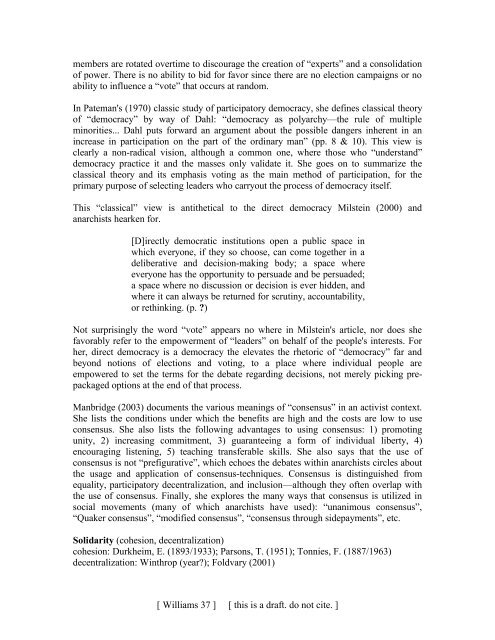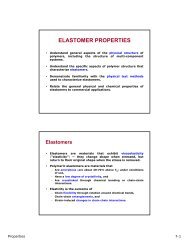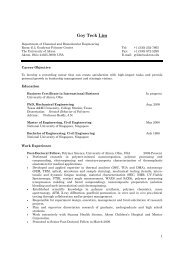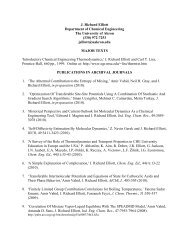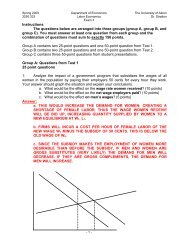Sociology of the Anarchists - Gozips.uakron.edu - The University of ...
Sociology of the Anarchists - Gozips.uakron.edu - The University of ...
Sociology of the Anarchists - Gozips.uakron.edu - The University of ...
Create successful ePaper yourself
Turn your PDF publications into a flip-book with our unique Google optimized e-Paper software.
members are rotated overtime to discourage <strong>the</strong> creation <strong>of</strong> “experts” and a consolidation<br />
<strong>of</strong> power. <strong>The</strong>re is no ability to bid for favor since <strong>the</strong>re are no election campaigns or no<br />
ability to influence a “vote” that occurs at random.<br />
In Pateman's (1970) classic study <strong>of</strong> participatory democracy, she defines classical <strong>the</strong>ory<br />
<strong>of</strong> “democracy” by way <strong>of</strong> Dahl: “democracy as polyarchy—<strong>the</strong> rule <strong>of</strong> multiple<br />
minorities... Dahl puts forward an argument about <strong>the</strong> possible dangers inherent in an<br />
increase in participation on <strong>the</strong> part <strong>of</strong> <strong>the</strong> ordinary man” (pp. 8 & 10). This view is<br />
clearly a non-radical vision, although a common one, where those who “understand”<br />
democracy practice it and <strong>the</strong> masses only validate it. She goes on to summarize <strong>the</strong><br />
classical <strong>the</strong>ory and its emphasis voting as <strong>the</strong> main method <strong>of</strong> participation, for <strong>the</strong><br />
primary purpose <strong>of</strong> selecting leaders who carryout <strong>the</strong> process <strong>of</strong> democracy itself.<br />
This “classical” view is anti<strong>the</strong>tical to <strong>the</strong> direct democracy Milstein (2000) and<br />
anarchists hearken for.<br />
[D]irectly democratic institutions open a public space in<br />
which everyone, if <strong>the</strong>y so choose, can come toge<strong>the</strong>r in a<br />
deliberative and decision-making body; a space where<br />
everyone has <strong>the</strong> opportunity to persuade and be persuaded;<br />
a space where no discussion or decision is ever hidden, and<br />
where it can always be returned for scrutiny, accountability,<br />
or rethinking. (p. ?)<br />
Not surprisingly <strong>the</strong> word “vote” appears no where in Milstein's article, nor does she<br />
favorably refer to <strong>the</strong> empowerment <strong>of</strong> “leaders” on behalf <strong>of</strong> <strong>the</strong> people's interests. For<br />
her, direct democracy is a democracy <strong>the</strong> elevates <strong>the</strong> rhetoric <strong>of</strong> “democracy” far and<br />
beyond notions <strong>of</strong> elections and voting, to a place where individual people are<br />
empowered to set <strong>the</strong> terms for <strong>the</strong> debate regarding decisions, not merely picking prepackaged<br />
options at <strong>the</strong> end <strong>of</strong> that process.<br />
Manbridge (2003) documents <strong>the</strong> various meanings <strong>of</strong> “consensus” in an activist context.<br />
She lists <strong>the</strong> conditions under which <strong>the</strong> benefits are high and <strong>the</strong> costs are low to use<br />
consensus. She also lists <strong>the</strong> following advantages to using consensus: 1) promoting<br />
unity, 2) increasing commitment, 3) guaranteeing a form <strong>of</strong> individual liberty, 4)<br />
encouraging listening, 5) teaching transferable skills. She also says that <strong>the</strong> use <strong>of</strong><br />
consensus is not “prefigurative”, which echoes <strong>the</strong> debates within anarchists circles about<br />
<strong>the</strong> usage and application <strong>of</strong> consensus-techniques. Consensus is distinguished from<br />
equality, participatory decentralization, and inclusion—although <strong>the</strong>y <strong>of</strong>ten overlap with<br />
<strong>the</strong> use <strong>of</strong> consensus. Finally, she explores <strong>the</strong> many ways that consensus is utilized in<br />
social movements (many <strong>of</strong> which anarchists have used): “unanimous consensus”,<br />
“Quaker consensus”, “modified consensus”, “consensus through sidepayments”, etc.<br />
Solidarity (cohesion, decentralization)<br />
cohesion: Durkheim, E. (1893/1933); Parsons, T. (1951); Tonnies, F. (1887/1963)<br />
decentralization: Winthrop (year?); Foldvary (2001)<br />
[ Williams 37 ] [ this is a draft. do not cite. ]


